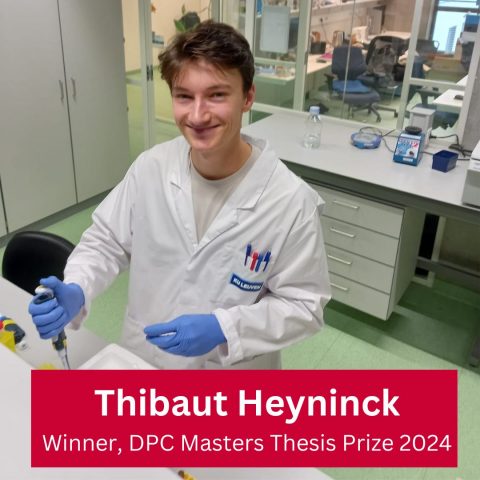 We are delighted to announce that Thibaut Heyninck, 24, has been selected by an international jury of Parkinson’s researchers as the first recipient of the Demoucelle Parkinson Charity’s annual prize for the best masters thesis by a young Belgian scientist addressing any aspect of Parkinson’s disease – diagnosis, impact, care, treatment or cure.
We are delighted to announce that Thibaut Heyninck, 24, has been selected by an international jury of Parkinson’s researchers as the first recipient of the Demoucelle Parkinson Charity’s annual prize for the best masters thesis by a young Belgian scientist addressing any aspect of Parkinson’s disease – diagnosis, impact, care, treatment or cure.
Along with other candidates from across Belgium, Mr. Heyninck submitted his thesis together with a short summary and was then shortlisted to present his work to the jury in a second round of adjudication.
Congratulations Thibaut!
Below you will find an interview with Thibaut in which he describes his work and future plans.
————-
 I am Thibaut Heyninck, 24 years old.
I am Thibaut Heyninck, 24 years old.
I recently obtained a Masters degree in Biomedical Sciences from KU Leuven, and undertook research for my master thesis in the laboratory of Professor Wim Vandenberghe. I have since gone on to begin my PhD in the same lab.
When I am not in the lab, I like to play tennis, travel and go to nice restaurants and bars for good food and drinks.
Please could you describe your Masters thesis.
I studied the role of mitophagy in the pathogenesis of Parkinson’s disease (PD). Mitophagy is a process in which damaged mitochondria [often referred to as the powerhouses of the cell] are identified and selectively degraded. This process prevents accumulation of these damaged mitochondria, which can produce toxic compounds.
I focused on PD patients with LRRK2 mutations, the most common known monogenic [single gene] cause of PD. Our lab collected skin cells from PD patients with LRRK2 mutations. The skin cells with LRRK2 mutations were then reprogrammed to become stem cells, which I then differentiated [transformed] to dopaminergic neurons, the cell type that dies in PD.
I compared the patient neurons with neurons that were genetically identical to the patient neurons except that the LRRK2 mutation had been corrected. I found that LRRK2 mutations impaired mitophagy in neurons. I am currently investigating the mechanism by which LRRK2 mutations exert this effect.
How has your research contributed to our understanding of Parkinson’s Disease?
Despite a great deal of effort, a disease-modifying treatment for PD is still not available. To develop such a treatment, I believe it is crucial to have a deep understanding of the molecular mechanisms. LRRK2 is a very complex protein. The better we understand how mutations in LRRK2 cause PD, the greater the chance that we will find effective ways to modulate LRRK2 to slow down PD.
Moreover, many studies have shown that mitochondrial dysfunction plays an important role in the pathogenesis of PD. However, it is not clear yet why mitochondrial dysfunction occurs. Impairment of mitophagy could offer a potential explanation. If further studies confirm that some of the mitochondrial alterations in PD result from impaired mitophagy, this pathway would be a promising target for a disease-modifying treatment.
 Why did you decide to research Parkinson’s disease for your Masters thesis?
Why did you decide to research Parkinson’s disease for your Masters thesis?
During my studies in biomedical sciences, I became fascinated by the molecular mechanisms that drive neurodegenerative diseases, and especially PD. I find it fascinating how a series of molecular events can result in selective neuronal cell death and eventually in such a severely disabling disease. I strongly believe in the importance of understanding the molecular mechanisms in the search for a disease-modifying treatment. In the hope of contributing a small part to this enormous puzzle, I decided to dedicate my master thesis to this research and am now also investigating these molecular mechanisms for my PhD.
Have you had any personal experience with Parkinson’s patients and what impact has that had on you?
I am fortunate that none of my friends and family have been diagnosed with PD.
What does it mean to you to receive this prize and what are your next steps/plans for the future?
I am very grateful to be selected as the winner of this year’s thesis prize. It was a great opportunity to present my work and to have an interesting discussion with the jury.
This prize feels like additional appreciation for the hard work and passion that went into this thesis and also highlights the importance of the work I am doing. This achievement further motivates me to continue to contribute to research on PD via my PhD and to hopefully have a positive impact in the field.
————————
The Demoucelle Parkinson Charity Masters Prize
The aim of the 1,000 euros Demoucelle Parkinson Charity Masters Prize is to encourage the next generation of researchers to pursue their studies and potentially their future careers in investigating this devastating neurological condition.
Applications for the 2025 Masters Prize can be submitted between 1 June 2025 and no later than 31 August 2025. For more information, please click on this link.
Our sincere thanks go to all the members of the 2024 Demoucelle Parkinson Charity Masters Prize jury:
- Nicolien Kolk – Jeroen Bosch Hospital in ‘s Hertogenbosch
- Heleen Verlinden – Muna Therapeutics
- Sandro Pereira – University of Luxemburg
- Ian Reynolds – Demoucelle Parkinson Charity
